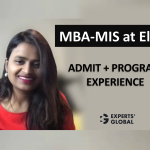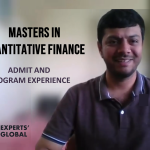Verbatim
Experts’ Global: Hi Rajat, thank you for taking out the time to talk with us today! Could you kindly share your story in your own words?
Rajat: I come from a Computer Science and Engineering background, and worked in Samsung Electronics’ R&D division for the first two years after my undergrad ended. Thereafter, I joined a tech manufacturing firm as a Co-founder, and my work therein showed me that I needed a formal business education. I started studying for the GMAT and applied to a few MBA programs, and with some MBA admissions consulting to aid me, secured an admit to the Fisher MBA. Currently, I work at Amazon as a Program Manager!
Experts’ Global: In your opinion, what actions of yours made the difference in your success?
Rajat: I think, in terms of my GMAT prep, working to identify my strengths and weaknesses in different conceptual areas was a great first step. Using a good-quality GMAT test series really helped me with that. Applying to your schools as early as possible in the admissions process is also ideal. As an MBA Ambassador at Fisher for two years, I can tell you with certainty that it makes a difference to your scholarship chances if you apply in the first round.
Researching my targeted schools well is the third action that I think made a difference. Make sure to reach out to current students and alumni from the MBAs you apply to so that you can get a first-hand report on the ground realities.
Experts’ Global: Looking back, what mistakes did you make in the process?
Rajat: One of the biggest mistakes I made was taking the GMAT five times. Taking the free GMAT mock that Experts’ Global offers, I was able to set a baseline for my expectations. When my initial attempts at the actual GMAT did not yield the high scores I wanted, I kept going perhaps to my detriment, without understanding that the MBA admissions journey is so much more than just the GMAT.
My scores on the fourth and fifth attempts were alike, so I figured I could not do any better and moved on. I only realized later on that the essay and interview aspects of the admissions process were as important as my GMAT, and that my energies could have been better engaged.
Experts’ Global: Regarding your GMAT preparation, what resources did you use and what advice do you have for future applicants?
Rajat: The official material has to be your starting point for GMAT prep. I have taken the GMAT five times, and can attest to the fact that the concepts and patterns presented in the official material are tested repeatedly on the actual exam.
Early on in my prep, I realized that Verbal was an area requiring significant attention. Once I realized that I was doing poorly in the Reading Comprehension section, I started working on a lot of Reading Comprehension exercises. The Manhattan Sentence Correction guidelines were also really helpful for me. The good thing is that there are many GMAT online courses that test takers can look to for assistance.
Experts’ Global: What would you say were your lessons from managing the application timeline?
Rajat: Experts’ Global’s help with the admissions process made a big difference in the ease with which I was able to navigate the entire journey. Overall, I learned not to leave off submitting my application until the day of the deadline, as there always seems to be a technical glitch that gets in the way then! In my case, I set reminders to complete and submit my application for each school at least three days before their stated respective deadlines.
Experts’ Global: How was your interview experience with the business schools?
Rajat: My MBA interview prep ensured that I had a relatively comfortable interview experience. As an MBA ambassador for Fisher, I actually held interviews with several candidates and can tell you that no interviewer wants to cause you discomfort. Even for an interviewer, the idea is to create a conversational environment to get the most authentic answers possible from the candidate.
Most of the questions I was asked in my interviews were behavioral. The panelists wanted to know about my MBA motivations, my post-program goals, and why I was applying to a particular school. I was also asked about what I had learned from my failures and how I handled adversity in the professional context.
Experts’ Global: What can you tell us about your MBA experience?
Rajat: My two years at Ohio State University Fisher College of Business were amazing. The first few months were a little difficult due to the cultural transition involved in moving to an unfamiliar country. The academic experience in the MBA was quite collaborative, with a constant emphasis on class discussions. Working with the admissions office as an ambassador also helped me integrate more quickly into the learning community.
As I grew more settled in my new environment, I began to add to it as well. I led two separate career treks for a 15-student group taking them to Seattle and San Francisco for company visits and alumni meets. The everyday learning process that I underwent in business school through case studies was also a big highlight for me, as was the onsite consulting project I undertook in Malaysia!
Experts’ Global: How has your job search during the MBA been and what advice do you have for future students on the same?
Rajat: The job search after my MBA was quite different from the one after my undergrad! For one, you do not have placements to rely upon. Your business school will provide you with resources, access to mentors, and entry into a vast alumni network, but you have to use these tools to find employment yourself. Networking becomes essential in the post-MBA job hunt, and so does your ability to sell your story well.
In my case, I reached out to several Fisher alumni working in fields and companies that synced with my career goals and attempted to build relationships with them. Through this outreach, I was able to land two jobs as a postgrad: one was in Singapore, with Apple, and the other was with GEP, a consultancy based in New York City. I got both opportunities through referrals from people I had reached out to!
Experts’ Global: What is your final word to the MBA aspirants out there?
Rajat: Try and work backward from where you imagine yourself to be five years after the MBA. Introspect about what vision for your future most resonates with you, and then work backward to see what steps you need to take to realize the same. Even during the MBA application process itself, start reaching out to alumni from your targeted schools who are in the field of your choice, and try and get their insights on their life path. Such conversations can often offer you clarity or a different viewpoint that can make a difference in your MBA admissions success!
Experts’ Global: Thank you for interviewing with us today, Rajat, and for the helpful insights you have put forth!
Rajat: Thank you as well!







